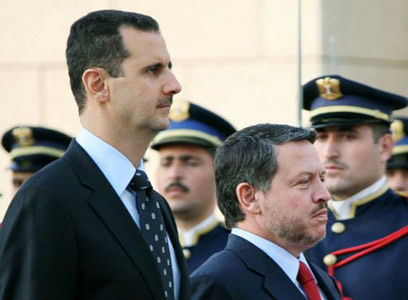
King Abdullah (L) and Assad: Rejected all foreign interference in Lebanon
צילום: רויטרס
Jordan's King Abdullah, Assad discuss Annapolis conference
Arab leaders meet in Damascus, express their 'commitment to support Arab, Palestinian and international efforts to establish an independent Palestinian state within the framework of the peace process and the two-state solution'
Jordan's King Abdullah II discussed an upcoming US-sponsored peace conference, Lebanon and Iraq with President Bashar Assad Sunday after arriving on a previously unannounced trip, his first to the Syrian capital in nearly four years, Syria's official news agency reported.
The reason for the surprise visit was not explained but it came few days before Arab foreign ministers are to meet in Cairo, Egypt, where they are expected to come up with a unified stand on the peace conference scheduled for later this month in Annapolis, Maryland.
Syria has repeatedly said it would attend the conference only if discussions included the return of the Golan Heights, a strategic plateau Israel captured from Syria in the 1967 Middle East war and later annexed. Although US officials have said the focus of the conference will be the Palestinian-Israeli conflict, Israeli Prime Minister Ehud Olmert said in recent days that he hoped Syria would take part.

King Abdullah (R) greeted by Assad in Damascus (Photo: Reuters)
A joint statement issued by the two leaders following their meeting made no direct mention of the Annapolis conference, beyond general references to supporting peacemaking efforts.
The leaders expressed their "commitment to support Arab, Palestinian and international efforts to establish an independent Palestinian state ... Within the framework of the peace process and the two-state solution," the statement said.
'Fulfill Palestinian aspirations'
The statement said the two leaders also underlined their full respect to the sovereignty of Lebanon and "rejected all foreign interference in Lebanon's internal affairs." They underscored the need for Lebanon to reach consensus on presidential elections scheduled to be held by Nov. 24, when pro-Syrian Lebanese President Emile Lahoud will step down.
The US, many European countries and the anti-Syrian parliamentary majority in Lebanon accuse Syria of trying to block the election of a Lebanese president, and blame it for a series of assassinations of anti-Syrian politicians in Lebanon. Syria denies the charges.
King Abdullah II and Assad stressed the importance of the "positive role that Syria can play to ensure Lebanon's stability and security and build normal relations between Beirut and Damascus based on mutual respect."
Jordan's chief government spokesman Nasser Judeh had described Sunday the visit by King Abdullah II to Syria as "important." He did not, however, detail the topics to be discussed.
A Royal Palace statement issued in Amman said the king's visit is in line with Jordanian "concern for the significance of Syrian participation in Arab efforts aimed at confronting challenges facing the Arab nation."
The statement quoted an unnamed palace official as saying that talks would focus on ways to "garner Arab and international support in a way that would fulfill Palestinian aspirations to statehood and ending Israel's occupation of all Arab lands."
Relations between neighbors Jordan and Syria have been bumpy for years, particularly in the last few months over a host of political issues. Tensions rose last year in the wake of the summer 2006 Israel-Hizbulllah war, when Assad called some Arab leaders "half men" for not supporting Hizbulllah during the war.
The last time the Jordanian king visited Syria was in February 2004.
The joint statement issued Sunday said the two leaders agreed that joint security committees immediately start addressing all pending security issues, including border delineation, border security, combating smuggling and the issue of prisoners.










